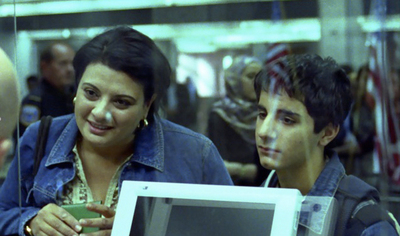"Amreeka" an engaging look at Palestinian-Americans
Amreeka Playing one show only at the Michigan Theater, 7:30 p.m. Thursday, March 11, as part of Ann Arbor Palestine Film Festival. Review by Jeff Meyers of the Metro Times Grade: B-

It's all about humility and restraint. First time Arab-American writer-director Cherien Dabis hops in the ever-deepening pool of immigrant displacement films to bring a kinder, gentler approach to her political and cultural messaging. By keeping the tone impish, the characters humane and the issues personal, "Amreeka" explores post-9/11 Arab anxieties and injustices without condemnation or proselytizing. In fact, Dabis smartly puts the focus on sisterhood and family while tackling the obstacles to assimilation and acceptance.
Palestinian single mom Muna (the engaging Nisreen Faour) moves to suburban Illinois with her teenage son Fadi (Melka Muallem) to be with her embittered sister Raghda's (Hiam Abbass) successful family. Set at the beginning of the Iraq War, it isn't long before the families are dealing with anti-Muslim discrimination, even though they aren't Muslim. And as you might expect, there are race-baiting teenagers, humorous cultural disconnections, blunt cultural pride and an ever-present sense of displacement. No one will accuse "Amreeka" of bucking the clichéd trends of the genre.
Having said that, Dabis' film engages with its warm heart, likable leads and sly humor. In particular, there's a clever allusion to Israeli-Palestinian partition as Muna's young nieces divide their bedroom with tape. Never giving in to victimization or self-righteousness, Muna endures her marginalization and misfortunes with a fiercely open heart and mind. She may not always make the smartest decisions but her intentions are generous and true. Both Faour and Abbass bring a rich sense of identity and affection to their sister characters, making clear their strengths and flaws. Furthermore, Dabis roots her story firmly in the Arab immigrant experience, keeping a steady hand on their perspectives and attitudes.
But for all the depth and insight she grants her earthy Palestinian characters, Dabis falls into unfortunate cliché when it comes to non-Arabs, who are mostly depicted as bullies, insensitive dolts or naive but sympathetic outcasts. Between the blue-haired nerd Muna works with at White Castle, the well-meaning Jewish principal who tentatively begins to court her or the irrational high school thugs who torment her son, suburban America comes closer to resembling a sitcom than a complex and contradictory culture. It's a bummer misstep in a movie that seems so carefully crafted to be compassionate.
Ultimately, "Amreeka" is too predictable to be great, too broad to be profound, but gentle, funny and conciliatory enough to check out and enjoy.
This review initially appeared in the Metro Times.

